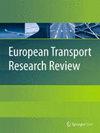Development of Mobility as a Service (MaaS) for intercity travel & rural/island areas: the case study of Greece
IF 4.2
3区 工程技术
Q1 TRANSPORTATION
引用次数: 0
Abstract
The specific features and requirements of island regions and rural areas make Mobility as a Service (MaaS) an attractive and evolving concept in the realm of Intercity/Rural/Island transportation. The primary goal of this research is to provide qualitative insights relative to the added value and development of MaaS for the previously mentioned transport services through a case study from Greece, a country with approximately 250 inhabited islands. In island settings, the primary societal motivation for MaaS is to enhance the accessibility of islands and improve individuals' access to multiple transport services. MaaS is found to have a strong potential to act as an enabler for more efficient transport and better accessibility to remote/island locations, acting in a complementary manner with currently applied “external” measures such as the Greek “Transport Equivalent”. To further assess the potential, development and impact of MaaS a focus group comprised by key-representatives from industry and academia stakeholders is created. The MaaS Ecosystem, as described by the experts, is comprised of the MaaS Provider, all the intercity/rural/island transport providers currently operating in the Greek market, MaaS Enabling entities (associations, regulators, investors, research institutions), the Integration Drivers and the customers. The issue of transport providers’ liability in case of disruptions and existing market regulations constitute, according to the results, an important challenge towards development of an Intercity MaaS, which needs to be addressed by legislative studies in a pan-European level. Most likely user groups for Intercity/Rural/Island MaaS are young people and digitally educated people, whilst less likely patronage groups are the elderly and “vulnerable” population groups. Relative to the external environment, high degree of fragmentation of the intercity transport industry combined by “autonomous” behavior of actors (“silo effect”) appears to be the greatest threat towards MaaS whilst anticipated capital investments in infrastructure and vehicles, which are foreseen in the proxime future, are the greatest opportunities.为城际旅行和农村/岛屿地区开发移动即服务(MaaS):希腊案例研究
岛屿地区和农村地区的具体特点和要求使得 "移动即服务"(MaaS)成为城际/农村/岛屿交通领域一个极具吸引力且不断发展的概念。本研究的主要目的是通过对希腊--一个拥有约 250 个有人居住岛屿的国家--的案例研究,提供有关 MaaS 对上述交通服务的附加值和发展的定性见解。在岛屿环境中,发展 MaaS 的主要社会动机是提高岛屿的可达性,改善个人获得多种交通服务的途径。研究发现,MaaS 具有强大的潜力,可作为提高交通效率和改善偏远/岛屿地区交通可达性的推动力,与目前应用的 "外部 "措施(如希腊的 "交通等价物")相辅相成。为进一步评估 MaaS 的潜力、发展和影响,成立了一个由行业和学术界利益相关者主要代表组成的焦点小组。根据专家的描述,MaaS 生态系统由 MaaS 提供商、目前在希腊市场运营的所有城际/农村/岛屿运输提供商、MaaS 扶持实体(协会、监管机构、投资者、研究机构)、整合驱动者和客户组成。根据研究结果,运输提供商在中断情况下的责任问题和现有市场法规构成了城际 MaaS 发展的重要挑战,需要通过泛欧层面的立法研究加以解决。城际/乡村/岛屿 MaaS 最有可能的用户群体是年轻人和受过数字教育的人,而老年人和 "弱势 "人群则不太可能成为用户群体。相对于外部环境而言,城际运输行业的高度分散以及参与者的 "自主 "行为("筒仓效应")似乎是 MaaS 面临的最大威胁,而预计在不久的将来对基础设施和车辆的资本投资则是最大的机遇。
本文章由计算机程序翻译,如有差异,请以英文原文为准。
求助全文
约1分钟内获得全文
求助全文
来源期刊

European Transport Research Review
Engineering-Mechanical Engineering
CiteScore
8.60
自引率
4.70%
发文量
49
审稿时长
13 weeks
期刊介绍:
European Transport Research Review (ETRR) is a peer-reviewed open access journal publishing original high-quality scholarly research and developments in areas related to transportation science, technologies, policy and practice. Established in 2008 by the European Conference of Transport Research Institutes (ECTRI), the Journal provides researchers and practitioners around the world with an authoritative forum for the dissemination and critical discussion of new ideas and methodologies that originate in, or are of special interest to, the European transport research community. The journal is unique in its field, as it covers all modes of transport and addresses both the engineering and the social science perspective, offering a truly multidisciplinary platform for researchers, practitioners, engineers and policymakers. ETRR is aimed at a readership including researchers, practitioners in the design and operation of transportation systems, and policymakers at the international, national, regional and local levels.
 求助内容:
求助内容: 应助结果提醒方式:
应助结果提醒方式:


